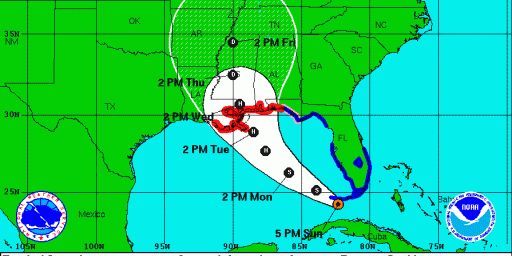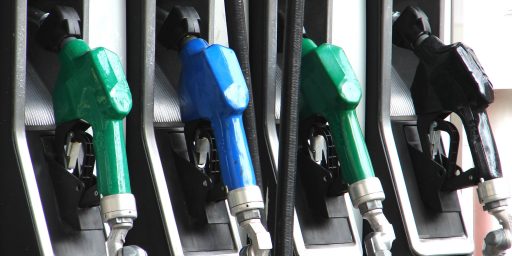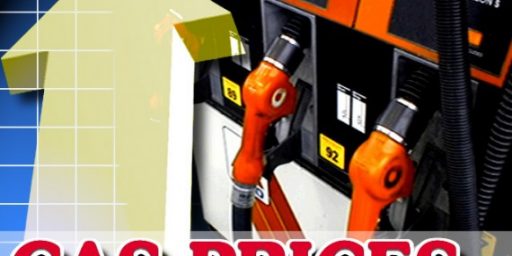Bush’s Poll Numbers Up
Proving once again that what goes down must come up, President Bush’s poll numbers have rebounded from the low point they reached in the immediate aftermath of Hurricane Katrina.
Bush’s poll numbers up (CNN)
President Bush’s standing with the public improved over the previous week as he made a highly visible effort to manage the consequences of the second major hurricane to hit the Gulf Coast in a month, a new poll out Thursday found. Bush’s job approval rating in the latest CNN/USA Today/Gallup poll climbed to 45 percent, and 71 percent said they approved of his handling of Hurricane Rita, which struck land Saturday near the Texas-Louisiana border. By comparison, only 40 percent said they approved of his handling of Hurricane Katrina, which hit near the Louisiana-Mississippi line August 29.
[…]
A similar poll released last week found only 40 percent approved of Bush’s job performance, and 41 percent approved of his handling of Katrina. An easing of public concern over gasoline prices also appeared to have contributed to the upward bump in Bush’s poll numbers.
[…]
Only 61 percent said higher gas prices caused them financial hardship, compared with 72 percent in a poll taken September 12-15. Another 38 percent said the prices had not caused them any hardship. Sixteen percent said the spike in prices at the pump had caused them severe hardship — down from 21 percent in the previous survey — and 45 percent called their suffering moderate.
But many consumers said they expect no relief from higher fuel prices in the next year: 51 percent said they believed gas prices would be either somewhat or much higher by this time in 2006, while just 23 percent expect the price to drop. Another 25 percent said they believe the price will remain about the same.
Bush has very little control over gasoline prices, of course, but we have been conditioned to associate all events in our lives with presidential authority.
An approval rating of 45 percent is still quite low but not surprising considering the uncertainty in Iraq, high gasoline prices, and worries about a housing bubble.






‘but we have been conditioned to associate all events in our lives with presidential authority.’
Gus Hall was right!
While the polls seem to indicate that Americans are becoming accustomed to higher gasoline prices causing the numbers to go up, It’s way to early to say that is a factor. Wait until the winter heating bill start to roll in and after that, let’s see where the poll numbers are. Another strong indicator will be the holiday shopping season. If the holiday spending turns out to be a bust, it will really affect the stock market, then watch for things to happen. Most businesses count on the holiday spending to make or break their yearly profit picture, and if it is down, it will certainly affect the economy of the entire country. Bush and Congress will sit on their hands until something big happens, then they will act. Right now, the wait and see criterion is the best route to follow.
Bush has very little control of gasoline prices “after the fact.”
If we wanted lower prices, there are certainly things, as a nation, we could have done to prepare for this day.
CAFE was supposed to do it, but CAFE with the light-truck exemption was as good as no CAFE at all – worse to the extent it gave people a false sense of progress.
45! Positively stratospheric! Now W. can start spending that political capital he’d garnered after the election, right?
Odo:
Well, Bush may have little control over gas prices, but let the economy of the US take a dive and then watch what Bush and Congress do.
You have to face the fact that the politician has a lot of tricks up their sleeves to control things. However, they will do nothing until the roof falls down. That’s reality.
The sad thing is that, if can extrapolate from action in some states, they’ll act by cutting gas taxes. That will serve to keep consumption high, and contribute to government deficit and debt.
I’d love to see Ford and GM bring over some of their European models. That might help them with their short-term crunch. I wouldn’t even oppose an emissions/saftey waiver, if they satisfy German rules. The German standards are probably better than a lot of existing cars on the road.
Talk about things getting bad … a GM near-or-full bankrupcy isn’t going to do the economy any good.
By the way … as a fast calculation, 24000 miles a year is not unheard of here in California, nor is 10 mpg in a truck or SUV. At $3/gal … (24000 / 10) * 3 = $7200 per year.
I’m sure there are people out there who haven’t figured out they are paying that. I mean, how can a median income person possibly allocate that much each year for gas?
Actually, given the news of 1) higher rates of credit card use at gas stations, and 2) higher rates of default on credit cards, it’s possible they are learning the hard way.
Update: I found a DOE page that has a number of reports on Energy Use in Transportation. It looks like the national average VMT (Vehicle Miles Traveled) per household is about 22K miles right now:
http://www.eia.doe.gov/emeu/rtecs/contents.html
Doing the math for a few MPG values, household fuel costs at $3/gal:
10 mpg = $6600/yr
20 mpg = $3300/yr
30 mpg = $2200/yr
40 mpg = $1650/yr
50 mpg = $1320/yr
diminishing returns, obviously … but a reason to get away from the
Flash”
Consumer spending is down by 1% due to high gas prices. The high gasoline prices are already starting to affect the economy. And down we gooooooo
Yeah Herb, things are not good. Apparently the US “savings rate” went negative in July and while I can’t find the link, I thought I saw that it has stayed there for the last three months.
One summary of events:
“The Commerce Department reported that consumer spending rose 1 percent in July, matching a strong June gain, as Americans streamed into auto showrooms to take advantage of sales enticements.
However, incomes rose by just 0.3 percent, not enough to cover the increased spending. As a result, the savings rate fell into negative territory at minus 0.6 percent, the lowest on record.
That meant Americans did not have enough left after paying their taxes to cover their spending in July. As a result, they dipped into savings stored up in previous months.”
http://www.kansascity.com/mld/kansascity/business/12538860.htm
I think it is one thing to say some people dipped into savings, but another to contemplate that the whole nation did, and that’s what it takes to tip the national average into negative territory.
Combine this with high rates of credit card default (how often did spending really “dip into savings” and how often did it just add debt?), and things don’t look real good.
President Bush has no control over gas prices? We basically own the oil in Iraq, we are drilling all over the planet, Bush’s whole administration is in bed with major oil companies, and the Bush family has a LONG – and VERY STRONG – history with the Saudi Royal Family. If you don’t have any pull with the oil companies with those kind of personal connections, then what good are you when you promise to help Americans with gas prices? Many countries around the globe are outraged over the climbing costs of gas – and many of their leaders (in particular, South American countries) have enacted price freezes in order to help their people. You don’t think Bush has that kind of power?